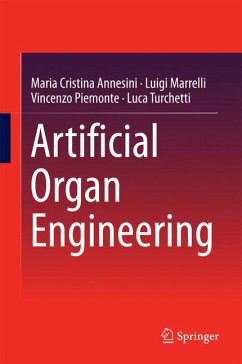Each artificial organ is presented with a short introduction provided by expert clinicians. Devices commonly used in clinical practice are reviewed and their performance is assessed and compared by using a mathematical model based approach. Whilst mathematical modelling is a fundamental tool for quantitative descriptions of clinical devices, models are kept simple to remain focused on the essential features of each process.
Postgraduate students and researchers in the field of chemical andbiomedical engineering will find that this book provides a novel and useful tool for the analysis of existing devices and, possibly, the design of new ones. This approach will also be useful for medical researchers who want to get a deeper insight into the basic working principles of artificial organs.
Dieser Download kann aus rechtlichen Gründen nur mit Rechnungsadresse in A, B, BG, CY, CZ, D, DK, EW, E, FIN, F, GR, HR, H, IRL, I, LT, L, LR, M, NL, PL, P, R, S, SLO, SK ausgeliefert werden.
Hinweis: Dieser Artikel kann nur an eine deutsche Lieferadresse ausgeliefert werden.


